Executive Summary Report: Toyota's Electric Car Investment Analysis
VerifiedAdded on 2020/07/22
|12
|2608
|133
Report
AI Summary
This report provides an executive summary and detailed analysis of the potential benefits and drawbacks for Toyota if it invests in the manufacturing of electric cars. It explores the changing landscape of the automotive industry, driven by government initiatives to reduce carbon emissions and promote electric vehicles (EVs). The report examines the advantages of EVs, such as reduced running costs, government incentives, and increasing consumer interest in safety and environmental responsibility. It also acknowledges the challenges, including the high initial investment costs, the need for charging infrastructure, and the potential for slower adoption rates. The report provides statistical data on the growth of the EV market, including global sales figures and the impact of government policies. It concludes that, despite the challenges, investment in electric cars is likely to be beneficial for Toyota, offering opportunities for increased revenue, enhanced brand image, and alignment with corporate social responsibility goals. The report highlights the importance of strategic planning and adaptation to the evolving market dynamics.
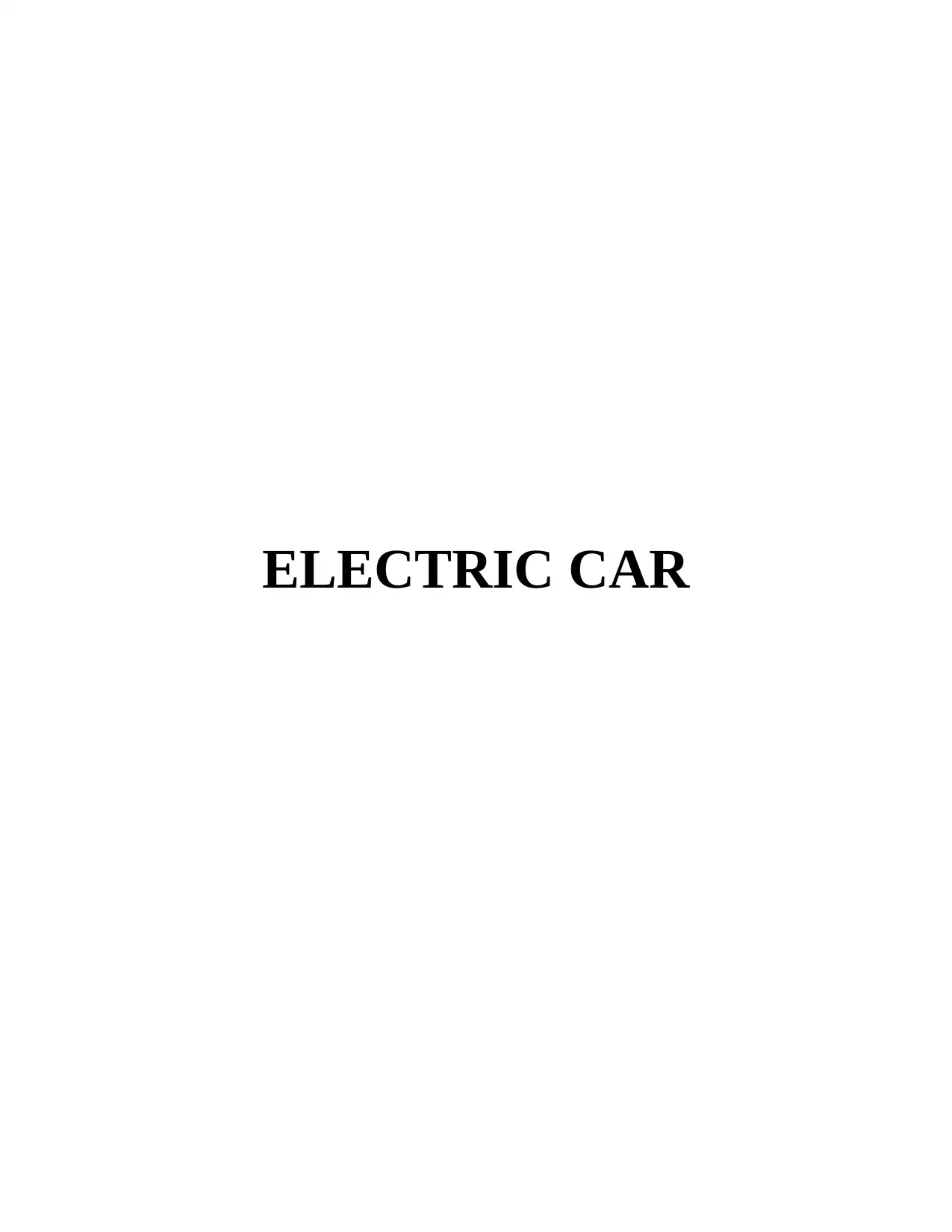
ELECTRIC CAR
Paraphrase This Document
Need a fresh take? Get an instant paraphrase of this document with our AI Paraphraser
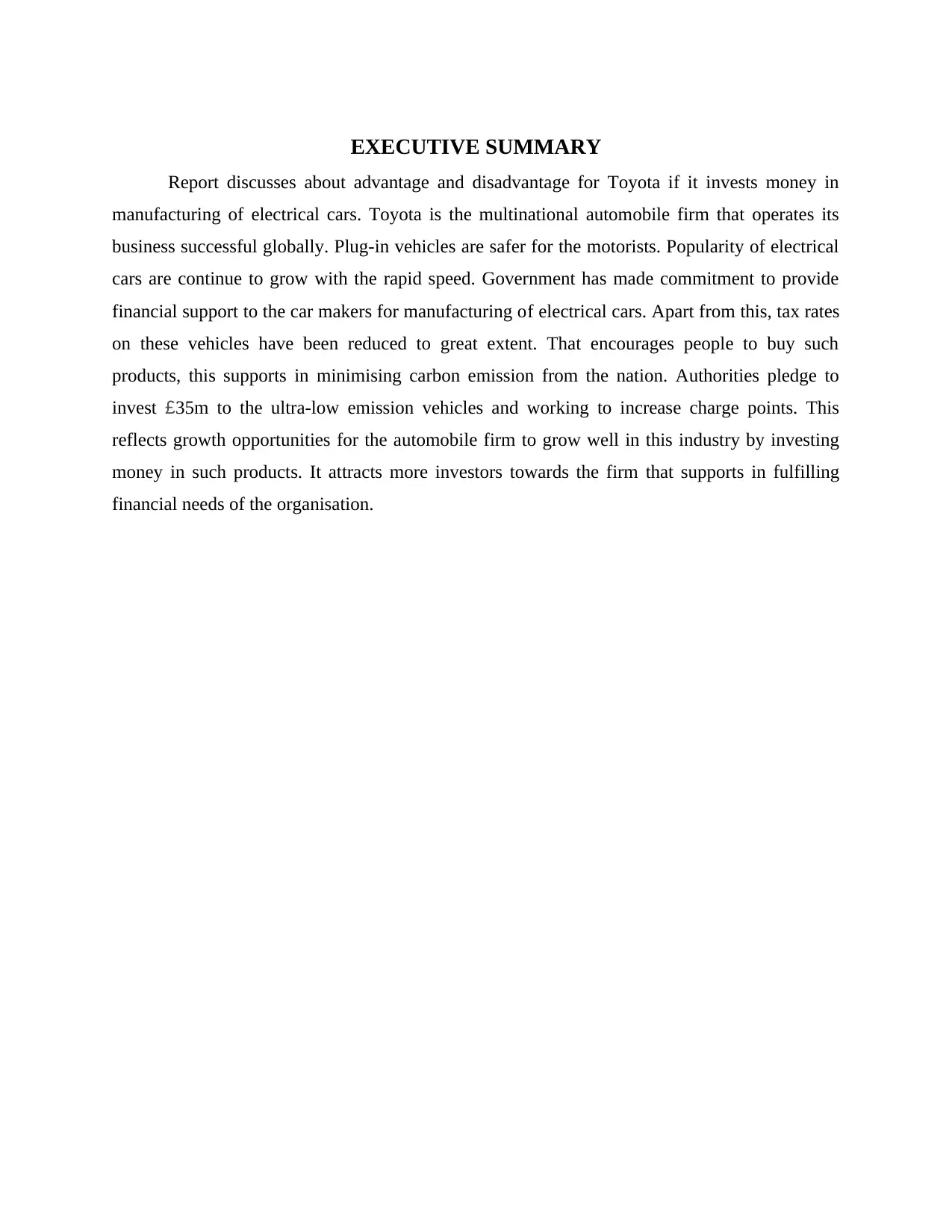
EXECUTIVE SUMMARY
Report discusses about advantage and disadvantage for Toyota if it invests money in
manufacturing of electrical cars. Toyota is the multinational automobile firm that operates its
business successful globally. Plug-in vehicles are safer for the motorists. Popularity of electrical
cars are continue to grow with the rapid speed. Government has made commitment to provide
financial support to the car makers for manufacturing of electrical cars. Apart from this, tax rates
on these vehicles have been reduced to great extent. That encourages people to buy such
products, this supports in minimising carbon emission from the nation. Authorities pledge to
invest £35m to the ultra-low emission vehicles and working to increase charge points. This
reflects growth opportunities for the automobile firm to grow well in this industry by investing
money in such products. It attracts more investors towards the firm that supports in fulfilling
financial needs of the organisation.
Report discusses about advantage and disadvantage for Toyota if it invests money in
manufacturing of electrical cars. Toyota is the multinational automobile firm that operates its
business successful globally. Plug-in vehicles are safer for the motorists. Popularity of electrical
cars are continue to grow with the rapid speed. Government has made commitment to provide
financial support to the car makers for manufacturing of electrical cars. Apart from this, tax rates
on these vehicles have been reduced to great extent. That encourages people to buy such
products, this supports in minimising carbon emission from the nation. Authorities pledge to
invest £35m to the ultra-low emission vehicles and working to increase charge points. This
reflects growth opportunities for the automobile firm to grow well in this industry by investing
money in such products. It attracts more investors towards the firm that supports in fulfilling
financial needs of the organisation.

Table of Contents
EXECUTIVE SUMMARY.............................................................................................................1
INTRODUCTION...........................................................................................................................1
MAIN BODY...................................................................................................................................1
Discussion...............................................................................................................................1
Justifications...........................................................................................................................4
CONCLUSION ...............................................................................................................................6
REFERENCES................................................................................................................................7
EXECUTIVE SUMMARY.............................................................................................................1
INTRODUCTION...........................................................................................................................1
MAIN BODY...................................................................................................................................1
Discussion...............................................................................................................................1
Justifications...........................................................................................................................4
CONCLUSION ...............................................................................................................................6
REFERENCES................................................................................................................................7
⊘ This is a preview!⊘
Do you want full access?
Subscribe today to unlock all pages.

Trusted by 1+ million students worldwide

Illustration Index
Illustration 1: Global sales record....................................................................................................3
Illustration 2: European EV sales....................................................................................................5
Illustration 1: Global sales record....................................................................................................3
Illustration 2: European EV sales....................................................................................................5
Paraphrase This Document
Need a fresh take? Get an instant paraphrase of this document with our AI Paraphraser
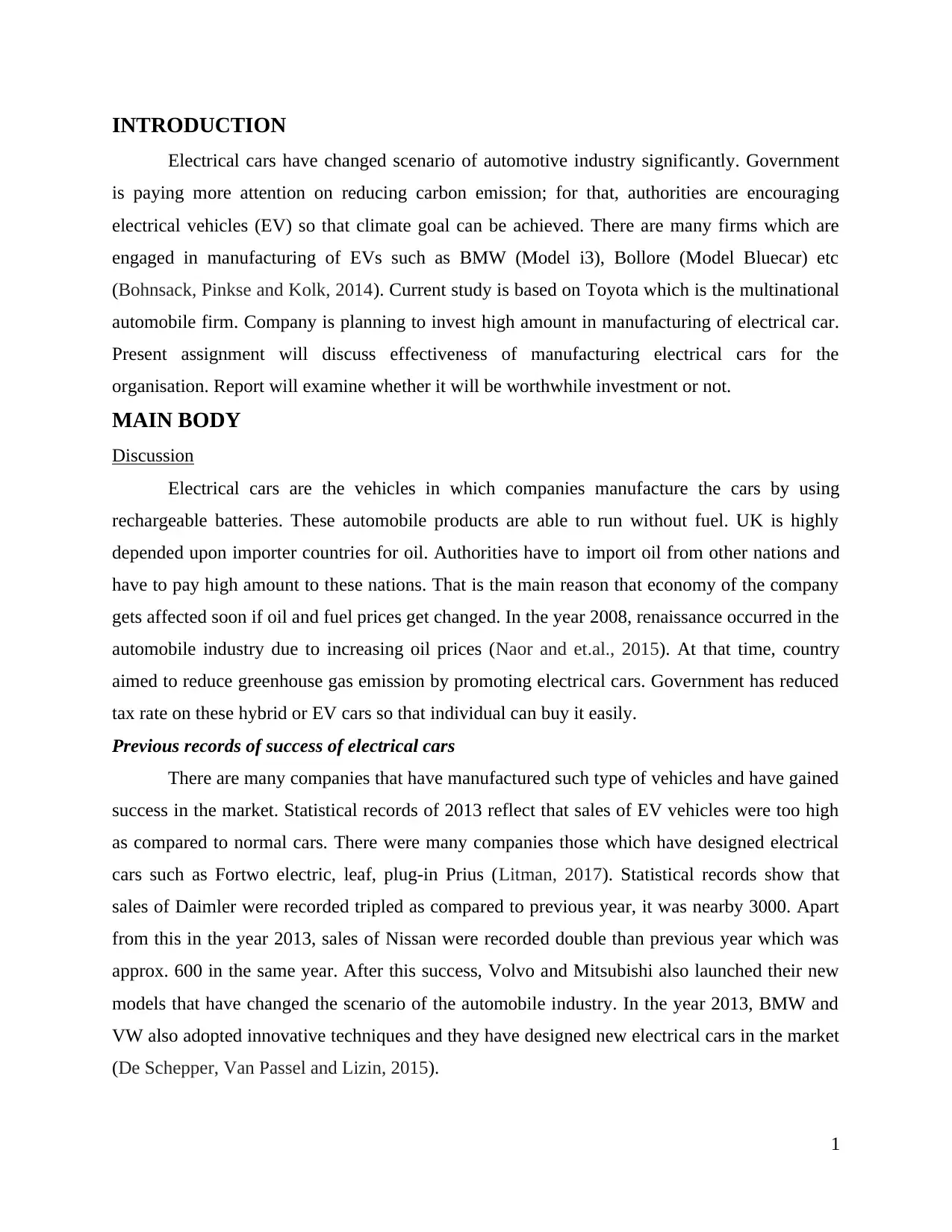
INTRODUCTION
Electrical cars have changed scenario of automotive industry significantly. Government
is paying more attention on reducing carbon emission; for that, authorities are encouraging
electrical vehicles (EV) so that climate goal can be achieved. There are many firms which are
engaged in manufacturing of EVs such as BMW (Model i3), Bollore (Model Bluecar) etc
(Bohnsack, Pinkse and Kolk, 2014). Current study is based on Toyota which is the multinational
automobile firm. Company is planning to invest high amount in manufacturing of electrical car.
Present assignment will discuss effectiveness of manufacturing electrical cars for the
organisation. Report will examine whether it will be worthwhile investment or not.
MAIN BODY
Discussion
Electrical cars are the vehicles in which companies manufacture the cars by using
rechargeable batteries. These automobile products are able to run without fuel. UK is highly
depended upon importer countries for oil. Authorities have to import oil from other nations and
have to pay high amount to these nations. That is the main reason that economy of the company
gets affected soon if oil and fuel prices get changed. In the year 2008, renaissance occurred in the
automobile industry due to increasing oil prices (Naor and et.al., 2015). At that time, country
aimed to reduce greenhouse gas emission by promoting electrical cars. Government has reduced
tax rate on these hybrid or EV cars so that individual can buy it easily.
Previous records of success of electrical cars
There are many companies that have manufactured such type of vehicles and have gained
success in the market. Statistical records of 2013 reflect that sales of EV vehicles were too high
as compared to normal cars. There were many companies those which have designed electrical
cars such as Fortwo electric, leaf, plug-in Prius (Litman, 2017). Statistical records show that
sales of Daimler were recorded tripled as compared to previous year, it was nearby 3000. Apart
from this in the year 2013, sales of Nissan were recorded double than previous year which was
approx. 600 in the same year. After this success, Volvo and Mitsubishi also launched their new
models that have changed the scenario of the automobile industry. In the year 2013, BMW and
VW also adopted innovative techniques and they have designed new electrical cars in the market
(De Schepper, Van Passel and Lizin, 2015).
1
Electrical cars have changed scenario of automotive industry significantly. Government
is paying more attention on reducing carbon emission; for that, authorities are encouraging
electrical vehicles (EV) so that climate goal can be achieved. There are many firms which are
engaged in manufacturing of EVs such as BMW (Model i3), Bollore (Model Bluecar) etc
(Bohnsack, Pinkse and Kolk, 2014). Current study is based on Toyota which is the multinational
automobile firm. Company is planning to invest high amount in manufacturing of electrical car.
Present assignment will discuss effectiveness of manufacturing electrical cars for the
organisation. Report will examine whether it will be worthwhile investment or not.
MAIN BODY
Discussion
Electrical cars are the vehicles in which companies manufacture the cars by using
rechargeable batteries. These automobile products are able to run without fuel. UK is highly
depended upon importer countries for oil. Authorities have to import oil from other nations and
have to pay high amount to these nations. That is the main reason that economy of the company
gets affected soon if oil and fuel prices get changed. In the year 2008, renaissance occurred in the
automobile industry due to increasing oil prices (Naor and et.al., 2015). At that time, country
aimed to reduce greenhouse gas emission by promoting electrical cars. Government has reduced
tax rate on these hybrid or EV cars so that individual can buy it easily.
Previous records of success of electrical cars
There are many companies that have manufactured such type of vehicles and have gained
success in the market. Statistical records of 2013 reflect that sales of EV vehicles were too high
as compared to normal cars. There were many companies those which have designed electrical
cars such as Fortwo electric, leaf, plug-in Prius (Litman, 2017). Statistical records show that
sales of Daimler were recorded tripled as compared to previous year, it was nearby 3000. Apart
from this in the year 2013, sales of Nissan were recorded double than previous year which was
approx. 600 in the same year. After this success, Volvo and Mitsubishi also launched their new
models that have changed the scenario of the automobile industry. In the year 2013, BMW and
VW also adopted innovative techniques and they have designed new electrical cars in the market
(De Schepper, Van Passel and Lizin, 2015).
1
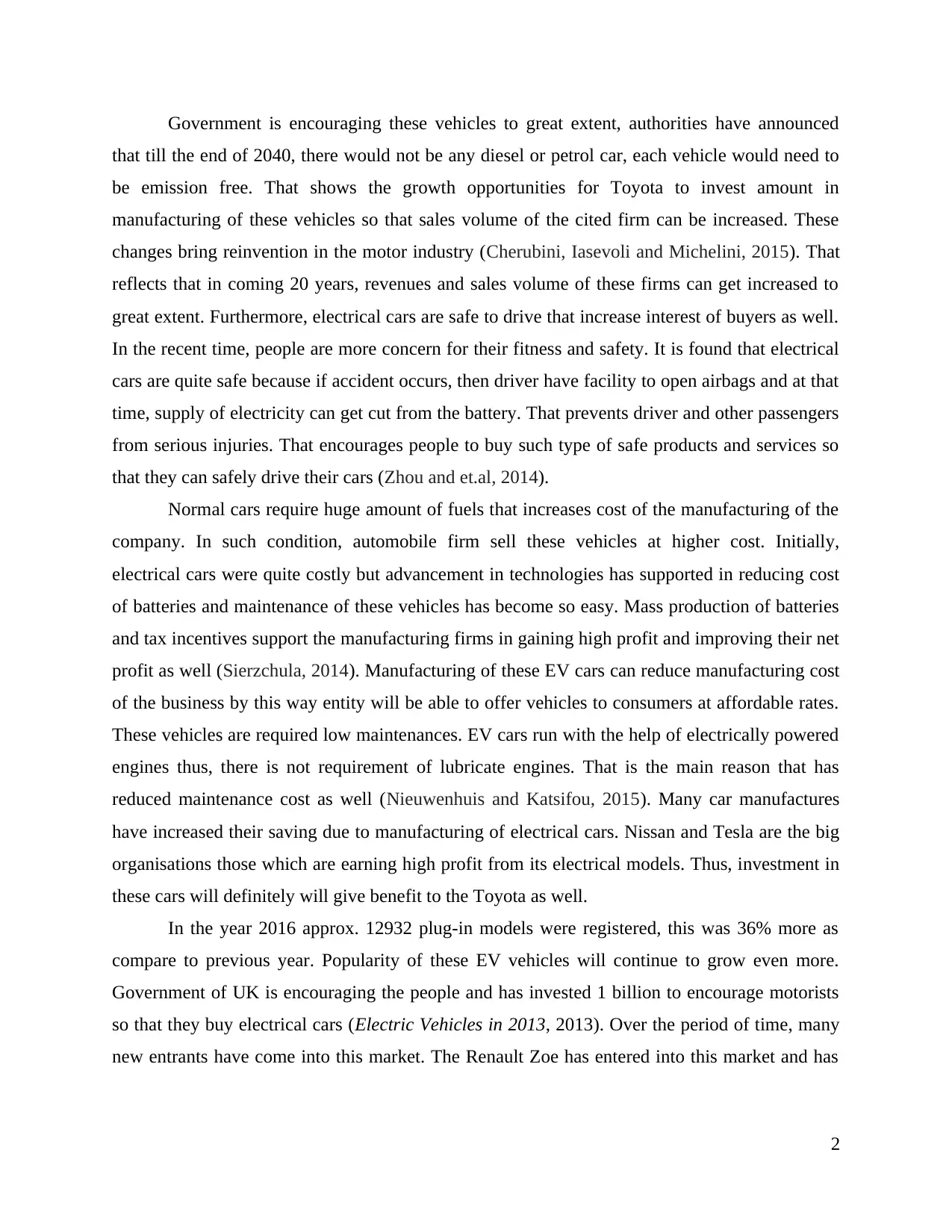
Government is encouraging these vehicles to great extent, authorities have announced
that till the end of 2040, there would not be any diesel or petrol car, each vehicle would need to
be emission free. That shows the growth opportunities for Toyota to invest amount in
manufacturing of these vehicles so that sales volume of the cited firm can be increased. These
changes bring reinvention in the motor industry (Cherubini, Iasevoli and Michelini, 2015). That
reflects that in coming 20 years, revenues and sales volume of these firms can get increased to
great extent. Furthermore, electrical cars are safe to drive that increase interest of buyers as well.
In the recent time, people are more concern for their fitness and safety. It is found that electrical
cars are quite safe because if accident occurs, then driver have facility to open airbags and at that
time, supply of electricity can get cut from the battery. That prevents driver and other passengers
from serious injuries. That encourages people to buy such type of safe products and services so
that they can safely drive their cars (Zhou and et.al, 2014).
Normal cars require huge amount of fuels that increases cost of the manufacturing of the
company. In such condition, automobile firm sell these vehicles at higher cost. Initially,
electrical cars were quite costly but advancement in technologies has supported in reducing cost
of batteries and maintenance of these vehicles has become so easy. Mass production of batteries
and tax incentives support the manufacturing firms in gaining high profit and improving their net
profit as well (Sierzchula, 2014). Manufacturing of these EV cars can reduce manufacturing cost
of the business by this way entity will be able to offer vehicles to consumers at affordable rates.
These vehicles are required low maintenances. EV cars run with the help of electrically powered
engines thus, there is not requirement of lubricate engines. That is the main reason that has
reduced maintenance cost as well (Nieuwenhuis and Katsifou, 2015). Many car manufactures
have increased their saving due to manufacturing of electrical cars. Nissan and Tesla are the big
organisations those which are earning high profit from its electrical models. Thus, investment in
these cars will definitely will give benefit to the Toyota as well.
In the year 2016 approx. 12932 plug-in models were registered, this was 36% more as
compare to previous year. Popularity of these EV vehicles will continue to grow even more.
Government of UK is encouraging the people and has invested 1 billion to encourage motorists
so that they buy electrical cars (Electric Vehicles in 2013, 2013). Over the period of time, many
new entrants have come into this market. The Renault Zoe has entered into this market and has
2
that till the end of 2040, there would not be any diesel or petrol car, each vehicle would need to
be emission free. That shows the growth opportunities for Toyota to invest amount in
manufacturing of these vehicles so that sales volume of the cited firm can be increased. These
changes bring reinvention in the motor industry (Cherubini, Iasevoli and Michelini, 2015). That
reflects that in coming 20 years, revenues and sales volume of these firms can get increased to
great extent. Furthermore, electrical cars are safe to drive that increase interest of buyers as well.
In the recent time, people are more concern for their fitness and safety. It is found that electrical
cars are quite safe because if accident occurs, then driver have facility to open airbags and at that
time, supply of electricity can get cut from the battery. That prevents driver and other passengers
from serious injuries. That encourages people to buy such type of safe products and services so
that they can safely drive their cars (Zhou and et.al, 2014).
Normal cars require huge amount of fuels that increases cost of the manufacturing of the
company. In such condition, automobile firm sell these vehicles at higher cost. Initially,
electrical cars were quite costly but advancement in technologies has supported in reducing cost
of batteries and maintenance of these vehicles has become so easy. Mass production of batteries
and tax incentives support the manufacturing firms in gaining high profit and improving their net
profit as well (Sierzchula, 2014). Manufacturing of these EV cars can reduce manufacturing cost
of the business by this way entity will be able to offer vehicles to consumers at affordable rates.
These vehicles are required low maintenances. EV cars run with the help of electrically powered
engines thus, there is not requirement of lubricate engines. That is the main reason that has
reduced maintenance cost as well (Nieuwenhuis and Katsifou, 2015). Many car manufactures
have increased their saving due to manufacturing of electrical cars. Nissan and Tesla are the big
organisations those which are earning high profit from its electrical models. Thus, investment in
these cars will definitely will give benefit to the Toyota as well.
In the year 2016 approx. 12932 plug-in models were registered, this was 36% more as
compare to previous year. Popularity of these EV vehicles will continue to grow even more.
Government of UK is encouraging the people and has invested 1 billion to encourage motorists
so that they buy electrical cars (Electric Vehicles in 2013, 2013). Over the period of time, many
new entrants have come into this market. The Renault Zoe has entered into this market and has
2
⊘ This is a preview!⊘
Do you want full access?
Subscribe today to unlock all pages.

Trusted by 1+ million students worldwide
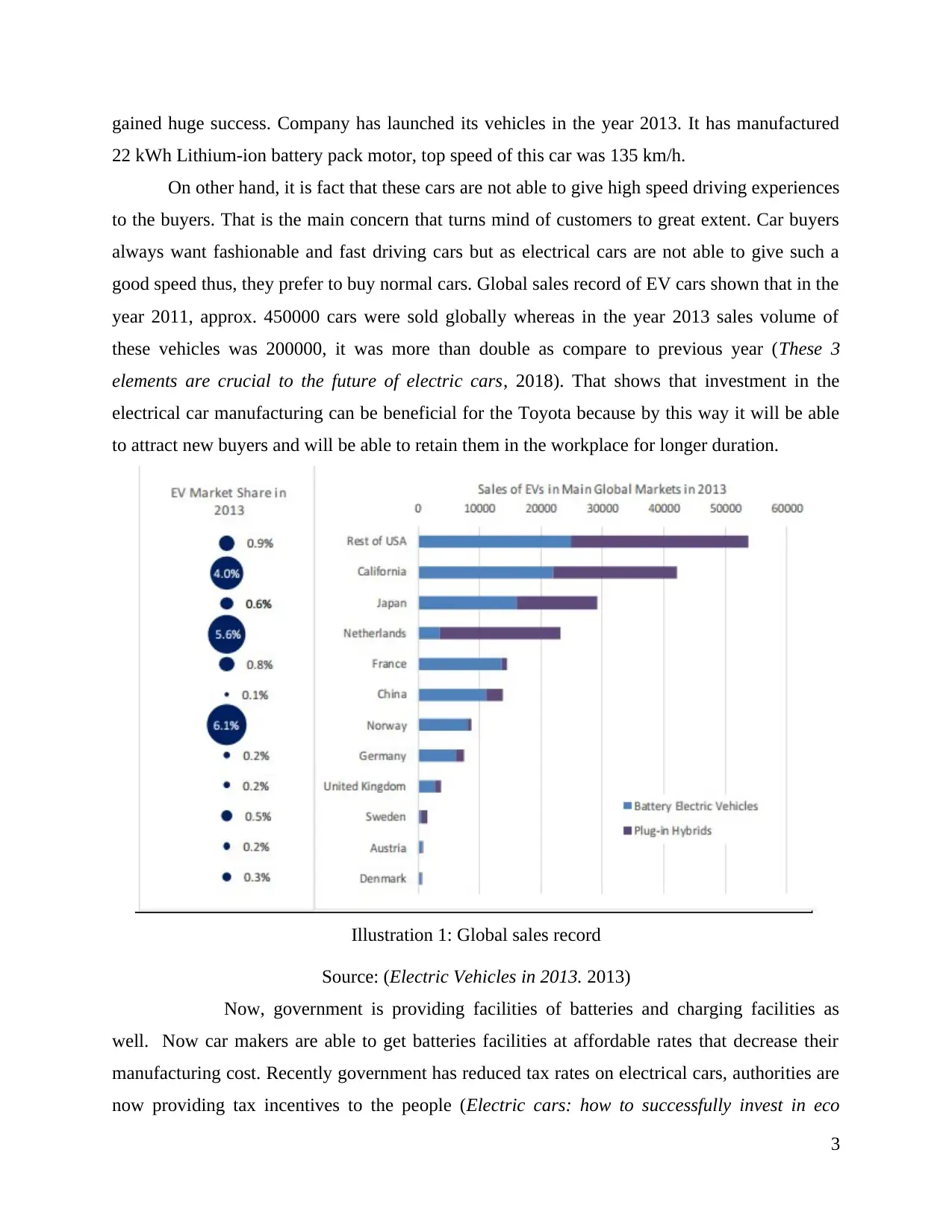
gained huge success. Company has launched its vehicles in the year 2013. It has manufactured
22 kWh Lithium-ion battery pack motor, top speed of this car was 135 km/h.
On other hand, it is fact that these cars are not able to give high speed driving experiences
to the buyers. That is the main concern that turns mind of customers to great extent. Car buyers
always want fashionable and fast driving cars but as electrical cars are not able to give such a
good speed thus, they prefer to buy normal cars. Global sales record of EV cars shown that in the
year 2011, approx. 450000 cars were sold globally whereas in the year 2013 sales volume of
these vehicles was 200000, it was more than double as compare to previous year (These 3
elements are crucial to the future of electric cars, 2018). That shows that investment in the
electrical car manufacturing can be beneficial for the Toyota because by this way it will be able
to attract new buyers and will be able to retain them in the workplace for longer duration.
Illustration 1: Global sales record
Source: (Electric Vehicles in 2013. 2013)
Now, government is providing facilities of batteries and charging facilities as
well. Now car makers are able to get batteries facilities at affordable rates that decrease their
manufacturing cost. Recently government has reduced tax rates on electrical cars, authorities are
now providing tax incentives to the people (Electric cars: how to successfully invest in eco
3
22 kWh Lithium-ion battery pack motor, top speed of this car was 135 km/h.
On other hand, it is fact that these cars are not able to give high speed driving experiences
to the buyers. That is the main concern that turns mind of customers to great extent. Car buyers
always want fashionable and fast driving cars but as electrical cars are not able to give such a
good speed thus, they prefer to buy normal cars. Global sales record of EV cars shown that in the
year 2011, approx. 450000 cars were sold globally whereas in the year 2013 sales volume of
these vehicles was 200000, it was more than double as compare to previous year (These 3
elements are crucial to the future of electric cars, 2018). That shows that investment in the
electrical car manufacturing can be beneficial for the Toyota because by this way it will be able
to attract new buyers and will be able to retain them in the workplace for longer duration.
Illustration 1: Global sales record
Source: (Electric Vehicles in 2013. 2013)
Now, government is providing facilities of batteries and charging facilities as
well. Now car makers are able to get batteries facilities at affordable rates that decrease their
manufacturing cost. Recently government has reduced tax rates on electrical cars, authorities are
now providing tax incentives to the people (Electric cars: how to successfully invest in eco
3
Paraphrase This Document
Need a fresh take? Get an instant paraphrase of this document with our AI Paraphraser
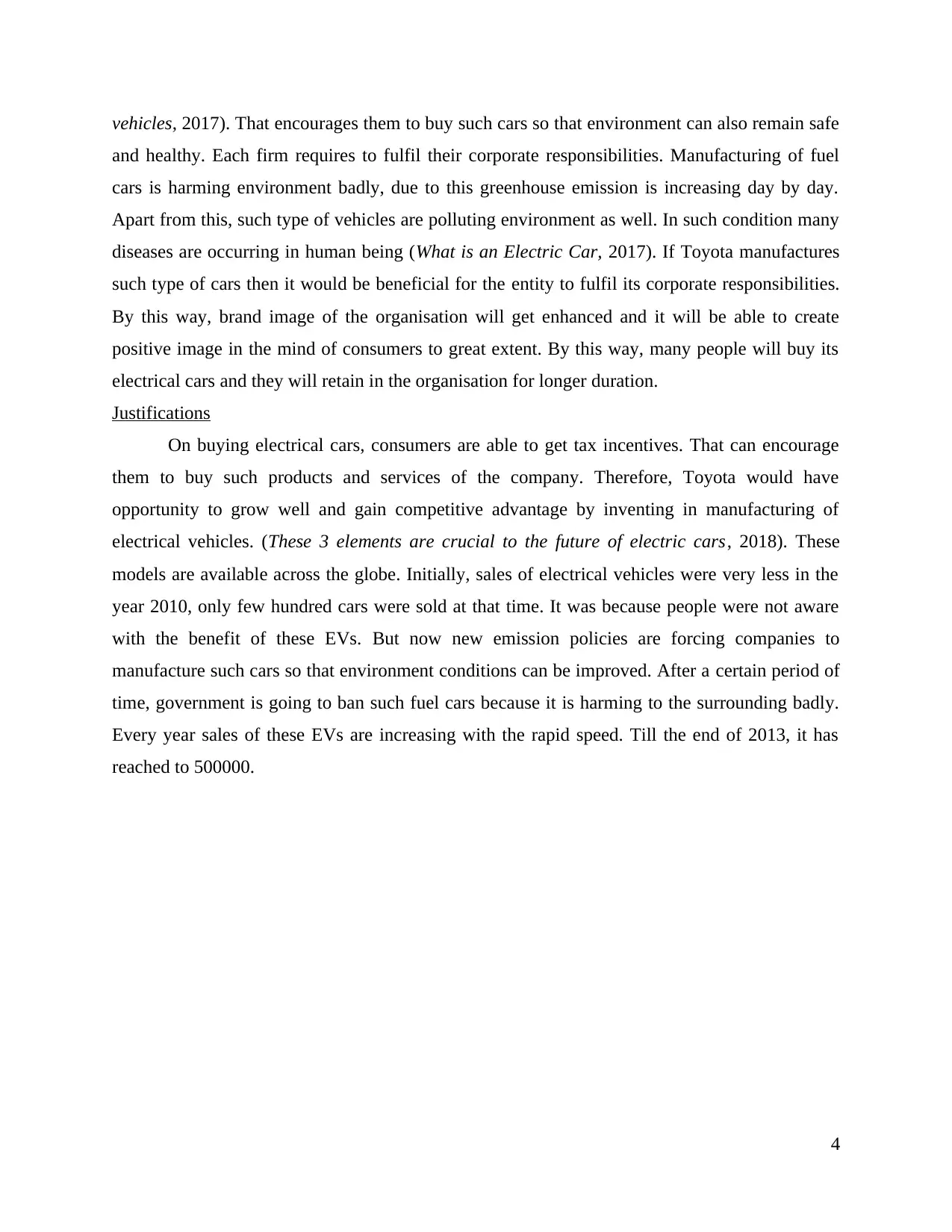
vehicles, 2017). That encourages them to buy such cars so that environment can also remain safe
and healthy. Each firm requires to fulfil their corporate responsibilities. Manufacturing of fuel
cars is harming environment badly, due to this greenhouse emission is increasing day by day.
Apart from this, such type of vehicles are polluting environment as well. In such condition many
diseases are occurring in human being (What is an Electric Car, 2017). If Toyota manufactures
such type of cars then it would be beneficial for the entity to fulfil its corporate responsibilities.
By this way, brand image of the organisation will get enhanced and it will be able to create
positive image in the mind of consumers to great extent. By this way, many people will buy its
electrical cars and they will retain in the organisation for longer duration.
Justifications
On buying electrical cars, consumers are able to get tax incentives. That can encourage
them to buy such products and services of the company. Therefore, Toyota would have
opportunity to grow well and gain competitive advantage by inventing in manufacturing of
electrical vehicles. (These 3 elements are crucial to the future of electric cars, 2018). These
models are available across the globe. Initially, sales of electrical vehicles were very less in the
year 2010, only few hundred cars were sold at that time. It was because people were not aware
with the benefit of these EVs. But now new emission policies are forcing companies to
manufacture such cars so that environment conditions can be improved. After a certain period of
time, government is going to ban such fuel cars because it is harming to the surrounding badly.
Every year sales of these EVs are increasing with the rapid speed. Till the end of 2013, it has
reached to 500000.
4
and healthy. Each firm requires to fulfil their corporate responsibilities. Manufacturing of fuel
cars is harming environment badly, due to this greenhouse emission is increasing day by day.
Apart from this, such type of vehicles are polluting environment as well. In such condition many
diseases are occurring in human being (What is an Electric Car, 2017). If Toyota manufactures
such type of cars then it would be beneficial for the entity to fulfil its corporate responsibilities.
By this way, brand image of the organisation will get enhanced and it will be able to create
positive image in the mind of consumers to great extent. By this way, many people will buy its
electrical cars and they will retain in the organisation for longer duration.
Justifications
On buying electrical cars, consumers are able to get tax incentives. That can encourage
them to buy such products and services of the company. Therefore, Toyota would have
opportunity to grow well and gain competitive advantage by inventing in manufacturing of
electrical vehicles. (These 3 elements are crucial to the future of electric cars, 2018). These
models are available across the globe. Initially, sales of electrical vehicles were very less in the
year 2010, only few hundred cars were sold at that time. It was because people were not aware
with the benefit of these EVs. But now new emission policies are forcing companies to
manufacture such cars so that environment conditions can be improved. After a certain period of
time, government is going to ban such fuel cars because it is harming to the surrounding badly.
Every year sales of these EVs are increasing with the rapid speed. Till the end of 2013, it has
reached to 500000.
4
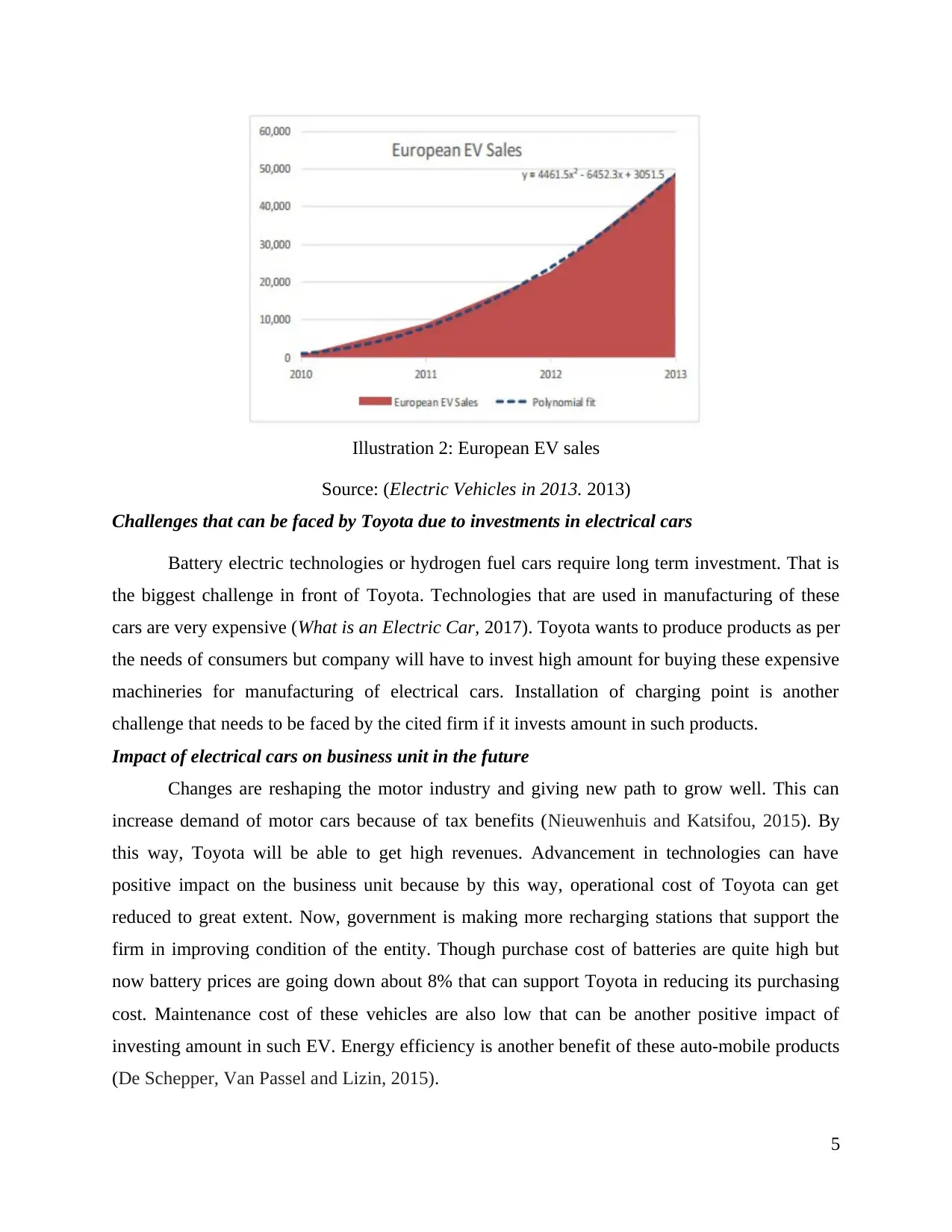
Illustration 2: European EV sales
Source: (Electric Vehicles in 2013. 2013)
Challenges that can be faced by Toyota due to investments in electrical cars
Battery electric technologies or hydrogen fuel cars require long term investment. That is
the biggest challenge in front of Toyota. Technologies that are used in manufacturing of these
cars are very expensive (What is an Electric Car, 2017). Toyota wants to produce products as per
the needs of consumers but company will have to invest high amount for buying these expensive
machineries for manufacturing of electrical cars. Installation of charging point is another
challenge that needs to be faced by the cited firm if it invests amount in such products.
Impact of electrical cars on business unit in the future
Changes are reshaping the motor industry and giving new path to grow well. This can
increase demand of motor cars because of tax benefits (Nieuwenhuis and Katsifou, 2015). By
this way, Toyota will be able to get high revenues. Advancement in technologies can have
positive impact on the business unit because by this way, operational cost of Toyota can get
reduced to great extent. Now, government is making more recharging stations that support the
firm in improving condition of the entity. Though purchase cost of batteries are quite high but
now battery prices are going down about 8% that can support Toyota in reducing its purchasing
cost. Maintenance cost of these vehicles are also low that can be another positive impact of
investing amount in such EV. Energy efficiency is another benefit of these auto-mobile products
(De Schepper, Van Passel and Lizin, 2015).
5
Source: (Electric Vehicles in 2013. 2013)
Challenges that can be faced by Toyota due to investments in electrical cars
Battery electric technologies or hydrogen fuel cars require long term investment. That is
the biggest challenge in front of Toyota. Technologies that are used in manufacturing of these
cars are very expensive (What is an Electric Car, 2017). Toyota wants to produce products as per
the needs of consumers but company will have to invest high amount for buying these expensive
machineries for manufacturing of electrical cars. Installation of charging point is another
challenge that needs to be faced by the cited firm if it invests amount in such products.
Impact of electrical cars on business unit in the future
Changes are reshaping the motor industry and giving new path to grow well. This can
increase demand of motor cars because of tax benefits (Nieuwenhuis and Katsifou, 2015). By
this way, Toyota will be able to get high revenues. Advancement in technologies can have
positive impact on the business unit because by this way, operational cost of Toyota can get
reduced to great extent. Now, government is making more recharging stations that support the
firm in improving condition of the entity. Though purchase cost of batteries are quite high but
now battery prices are going down about 8% that can support Toyota in reducing its purchasing
cost. Maintenance cost of these vehicles are also low that can be another positive impact of
investing amount in such EV. Energy efficiency is another benefit of these auto-mobile products
(De Schepper, Van Passel and Lizin, 2015).
5
⊘ This is a preview!⊘
Do you want full access?
Subscribe today to unlock all pages.

Trusted by 1+ million students worldwide
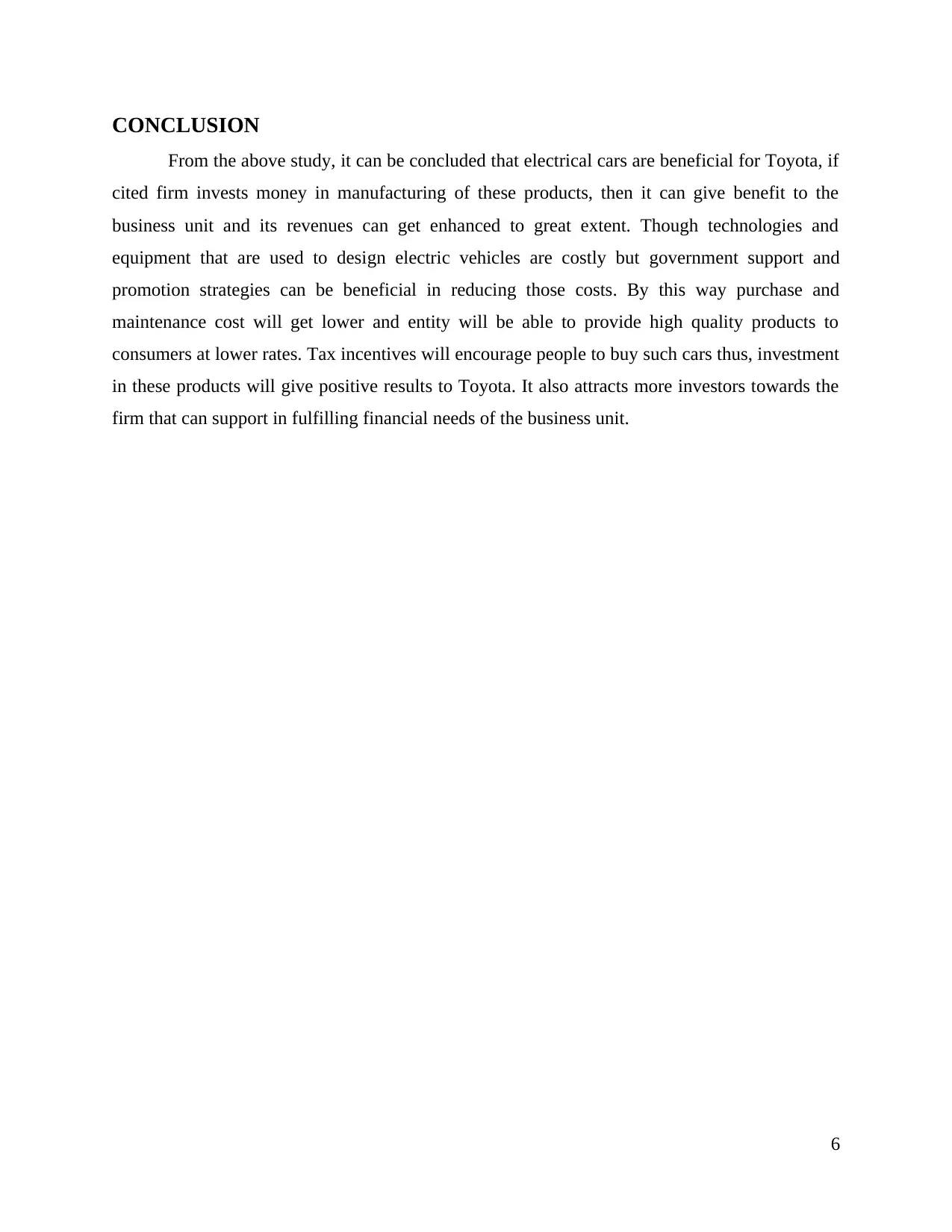
CONCLUSION
From the above study, it can be concluded that electrical cars are beneficial for Toyota, if
cited firm invests money in manufacturing of these products, then it can give benefit to the
business unit and its revenues can get enhanced to great extent. Though technologies and
equipment that are used to design electric vehicles are costly but government support and
promotion strategies can be beneficial in reducing those costs. By this way purchase and
maintenance cost will get lower and entity will be able to provide high quality products to
consumers at lower rates. Tax incentives will encourage people to buy such cars thus, investment
in these products will give positive results to Toyota. It also attracts more investors towards the
firm that can support in fulfilling financial needs of the business unit.
6
From the above study, it can be concluded that electrical cars are beneficial for Toyota, if
cited firm invests money in manufacturing of these products, then it can give benefit to the
business unit and its revenues can get enhanced to great extent. Though technologies and
equipment that are used to design electric vehicles are costly but government support and
promotion strategies can be beneficial in reducing those costs. By this way purchase and
maintenance cost will get lower and entity will be able to provide high quality products to
consumers at lower rates. Tax incentives will encourage people to buy such cars thus, investment
in these products will give positive results to Toyota. It also attracts more investors towards the
firm that can support in fulfilling financial needs of the business unit.
6
Paraphrase This Document
Need a fresh take? Get an instant paraphrase of this document with our AI Paraphraser
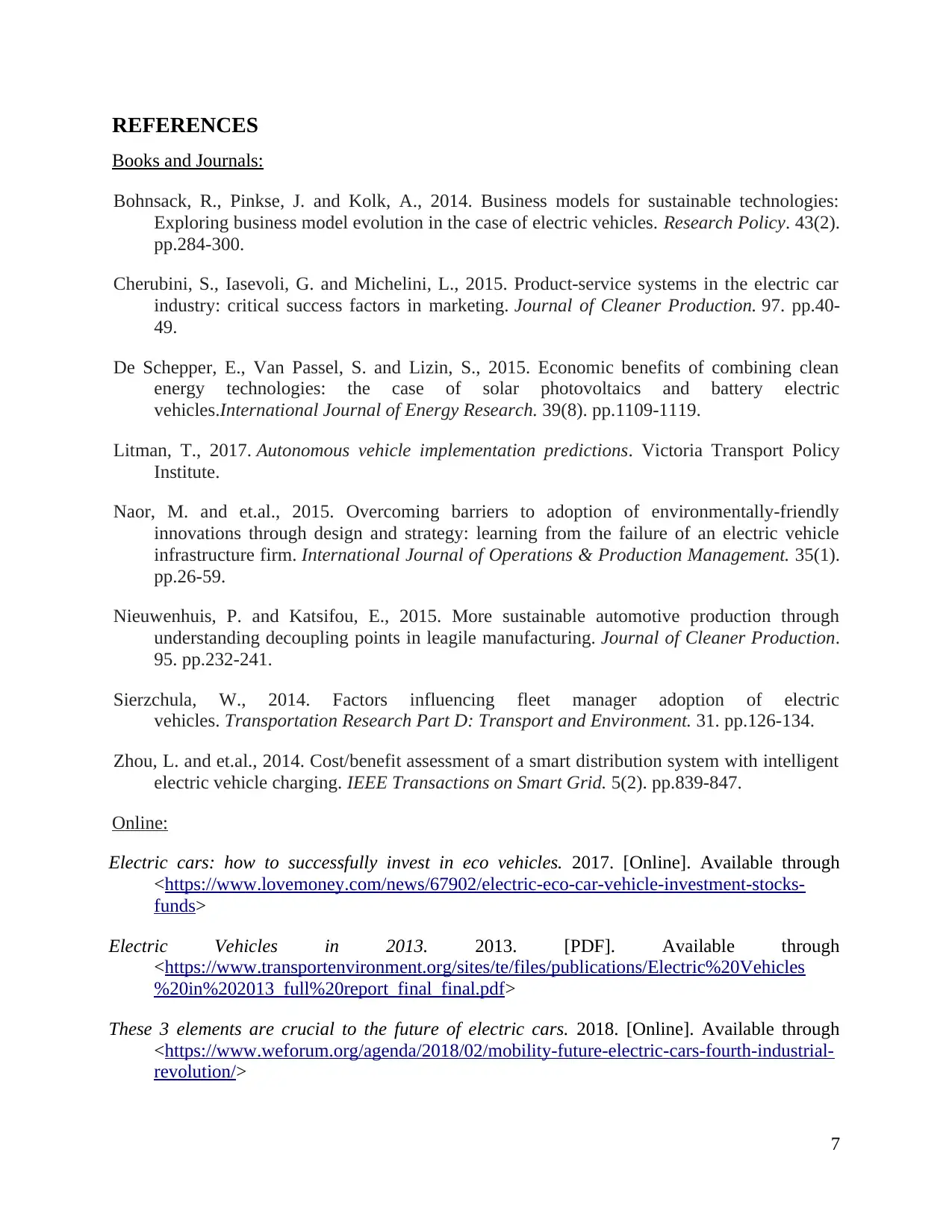
REFERENCES
Books and Journals:
Bohnsack, R., Pinkse, J. and Kolk, A., 2014. Business models for sustainable technologies:
Exploring business model evolution in the case of electric vehicles. Research Policy. 43(2).
pp.284-300.
Cherubini, S., Iasevoli, G. and Michelini, L., 2015. Product-service systems in the electric car
industry: critical success factors in marketing. Journal of Cleaner Production. 97. pp.40-
49.
De Schepper, E., Van Passel, S. and Lizin, S., 2015. Economic benefits of combining clean
energy technologies: the case of solar photovoltaics and battery electric
vehicles.International Journal of Energy Research. 39(8). pp.1109-1119.
Litman, T., 2017. Autonomous vehicle implementation predictions. Victoria Transport Policy
Institute.
Naor, M. and et.al., 2015. Overcoming barriers to adoption of environmentally-friendly
innovations through design and strategy: learning from the failure of an electric vehicle
infrastructure firm. International Journal of Operations & Production Management. 35(1).
pp.26-59.
Nieuwenhuis, P. and Katsifou, E., 2015. More sustainable automotive production through
understanding decoupling points in leagile manufacturing. Journal of Cleaner Production.
95. pp.232-241.
Sierzchula, W., 2014. Factors influencing fleet manager adoption of electric
vehicles. Transportation Research Part D: Transport and Environment. 31. pp.126-134.
Zhou, L. and et.al., 2014. Cost/benefit assessment of a smart distribution system with intelligent
electric vehicle charging. IEEE Transactions on Smart Grid. 5(2). pp.839-847.
Online:
Electric cars: how to successfully invest in eco vehicles. 2017. [Online]. Available through
<https://www.lovemoney.com/news/67902/electric-eco-car-vehicle-investment-stocks-
funds>
Electric Vehicles in 2013. 2013. [PDF]. Available through
<https://www.transportenvironment.org/sites/te/files/publications/Electric%20Vehicles
%20in%202013_full%20report_final_final.pdf>
These 3 elements are crucial to the future of electric cars. 2018. [Online]. Available through
<https://www.weforum.org/agenda/2018/02/mobility-future-electric-cars-fourth-industrial-
revolution/>
7
Books and Journals:
Bohnsack, R., Pinkse, J. and Kolk, A., 2014. Business models for sustainable technologies:
Exploring business model evolution in the case of electric vehicles. Research Policy. 43(2).
pp.284-300.
Cherubini, S., Iasevoli, G. and Michelini, L., 2015. Product-service systems in the electric car
industry: critical success factors in marketing. Journal of Cleaner Production. 97. pp.40-
49.
De Schepper, E., Van Passel, S. and Lizin, S., 2015. Economic benefits of combining clean
energy technologies: the case of solar photovoltaics and battery electric
vehicles.International Journal of Energy Research. 39(8). pp.1109-1119.
Litman, T., 2017. Autonomous vehicle implementation predictions. Victoria Transport Policy
Institute.
Naor, M. and et.al., 2015. Overcoming barriers to adoption of environmentally-friendly
innovations through design and strategy: learning from the failure of an electric vehicle
infrastructure firm. International Journal of Operations & Production Management. 35(1).
pp.26-59.
Nieuwenhuis, P. and Katsifou, E., 2015. More sustainable automotive production through
understanding decoupling points in leagile manufacturing. Journal of Cleaner Production.
95. pp.232-241.
Sierzchula, W., 2014. Factors influencing fleet manager adoption of electric
vehicles. Transportation Research Part D: Transport and Environment. 31. pp.126-134.
Zhou, L. and et.al., 2014. Cost/benefit assessment of a smart distribution system with intelligent
electric vehicle charging. IEEE Transactions on Smart Grid. 5(2). pp.839-847.
Online:
Electric cars: how to successfully invest in eco vehicles. 2017. [Online]. Available through
<https://www.lovemoney.com/news/67902/electric-eco-car-vehicle-investment-stocks-
funds>
Electric Vehicles in 2013. 2013. [PDF]. Available through
<https://www.transportenvironment.org/sites/te/files/publications/Electric%20Vehicles
%20in%202013_full%20report_final_final.pdf>
These 3 elements are crucial to the future of electric cars. 2018. [Online]. Available through
<https://www.weforum.org/agenda/2018/02/mobility-future-electric-cars-fourth-industrial-
revolution/>
7

What is an Electric Car, 2017. [Online]. Available through <https://www.conserve-energy-
future.com/advantages-and-disadvantages-of-electric-cars.php>
8
future.com/advantages-and-disadvantages-of-electric-cars.php>
8
⊘ This is a preview!⊘
Do you want full access?
Subscribe today to unlock all pages.

Trusted by 1+ million students worldwide
1 out of 12
Related Documents
Your All-in-One AI-Powered Toolkit for Academic Success.
+13062052269
info@desklib.com
Available 24*7 on WhatsApp / Email
![[object Object]](/_next/static/media/star-bottom.7253800d.svg)
Unlock your academic potential
Copyright © 2020–2026 A2Z Services. All Rights Reserved. Developed and managed by ZUCOL.





